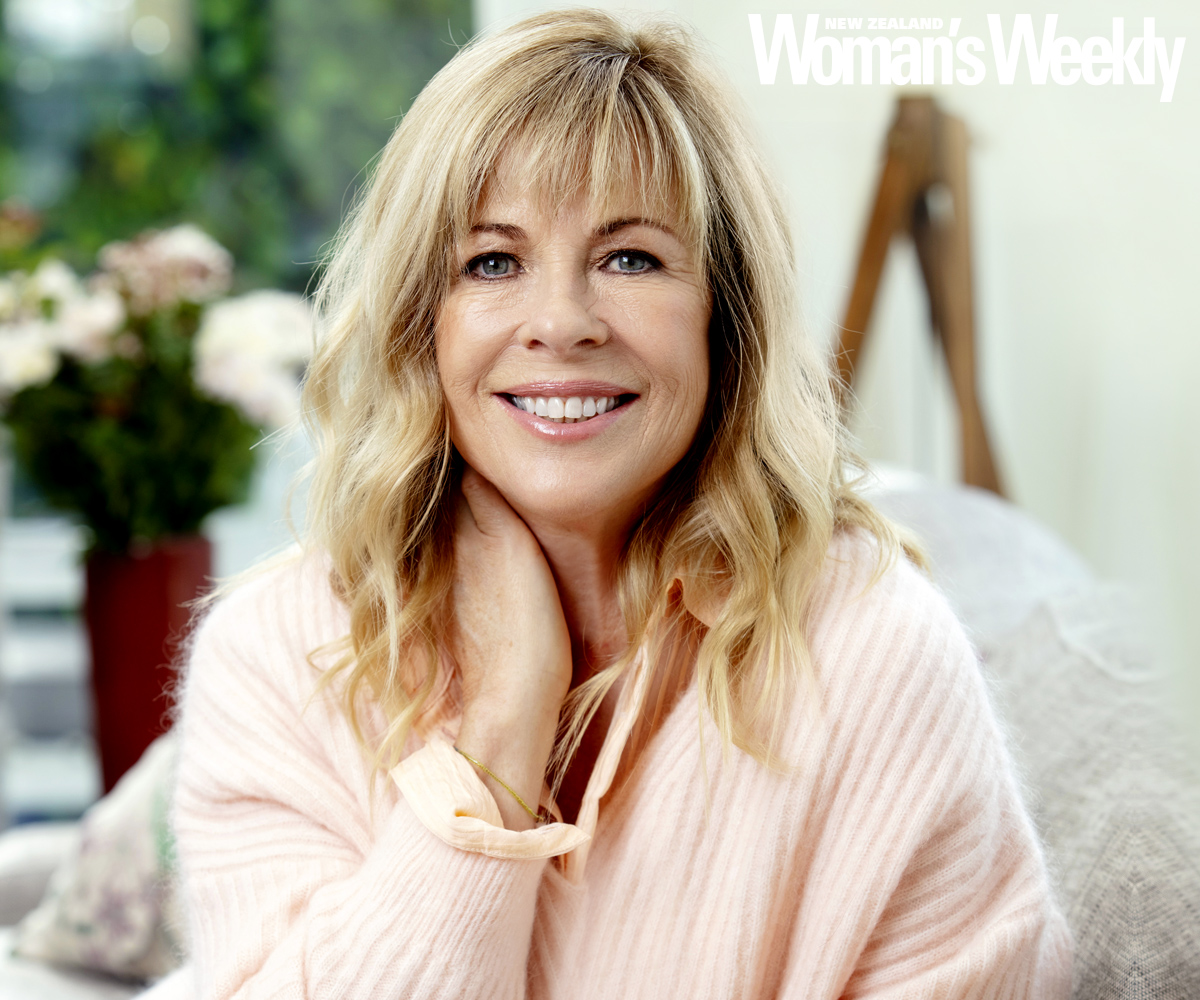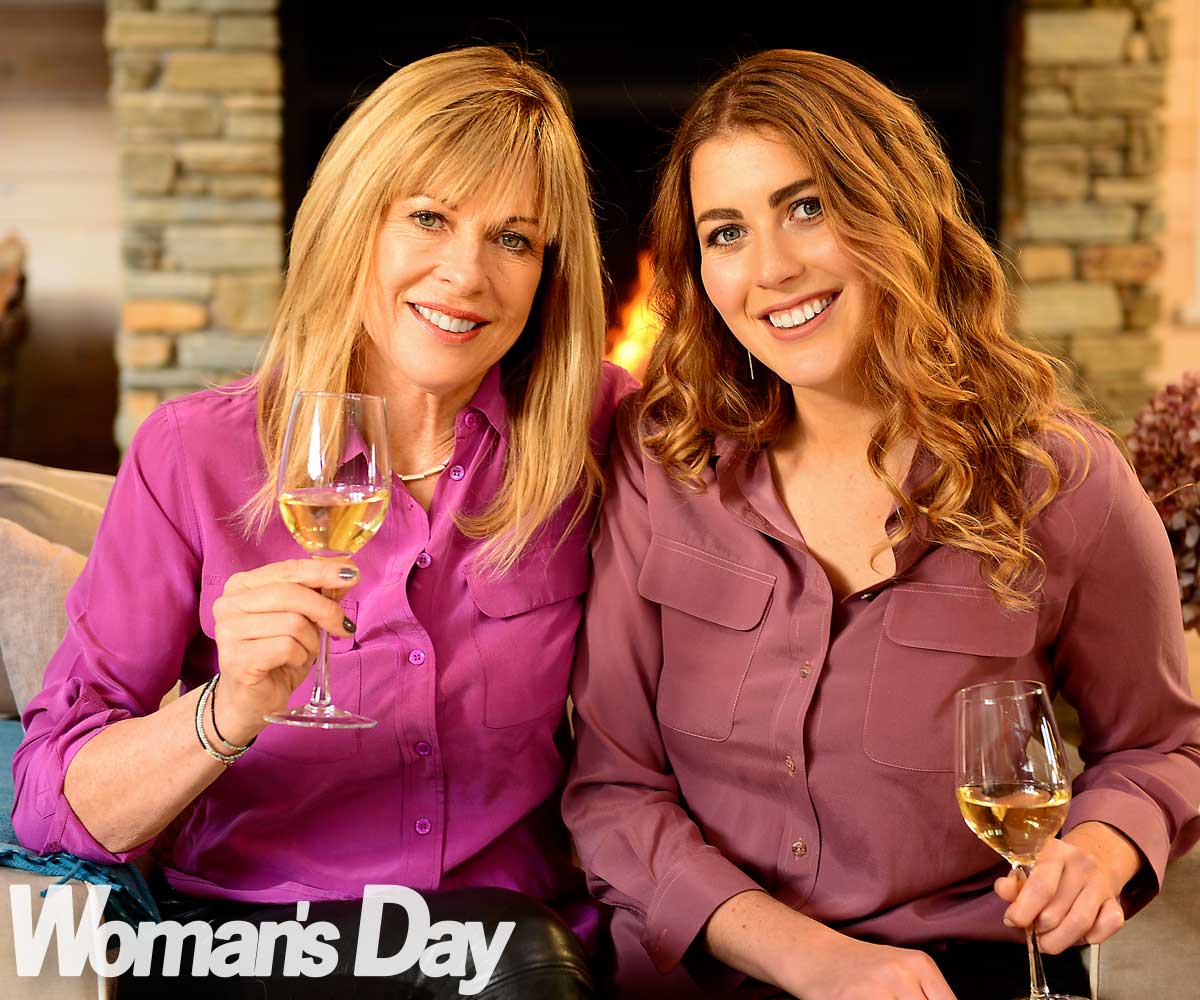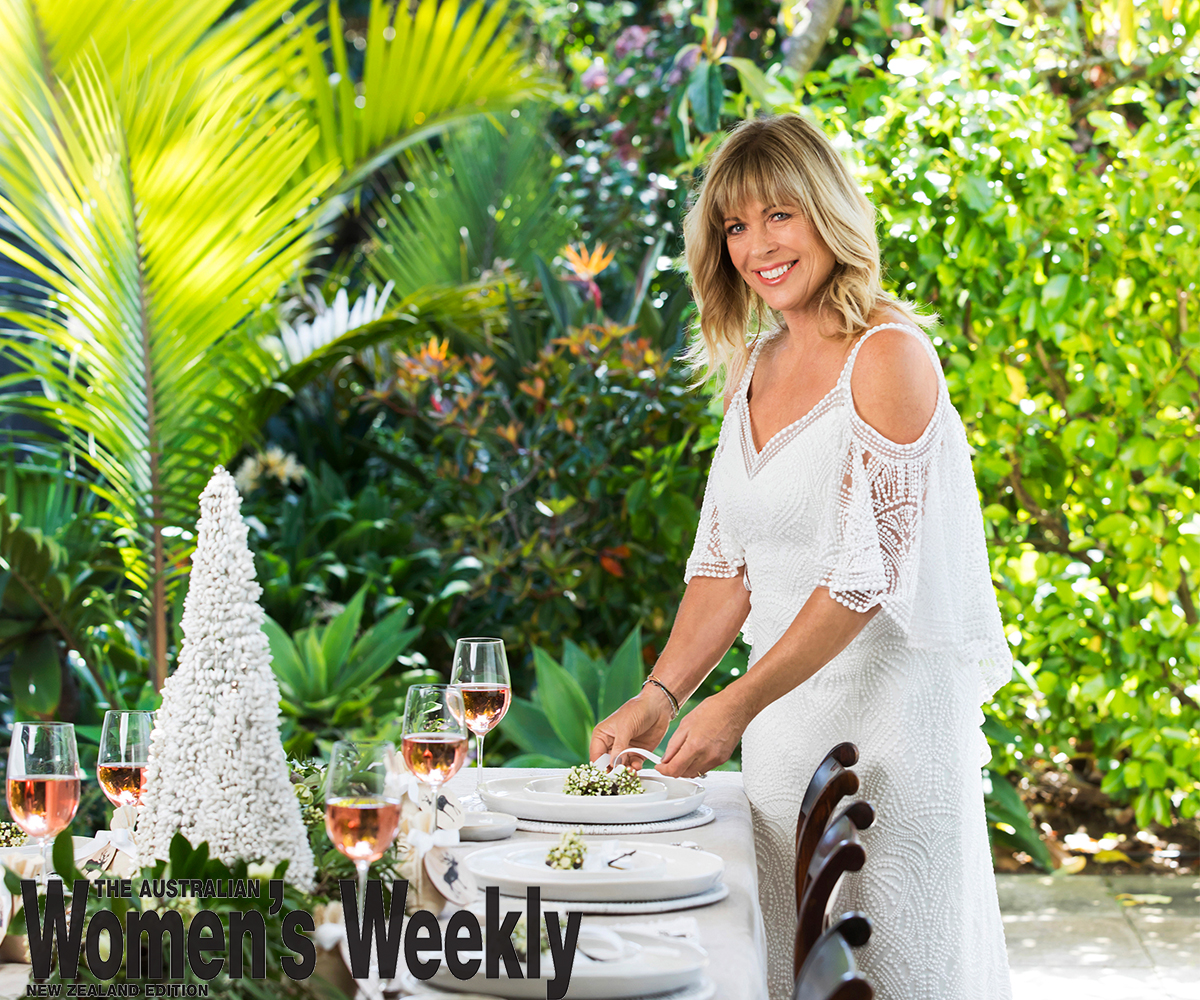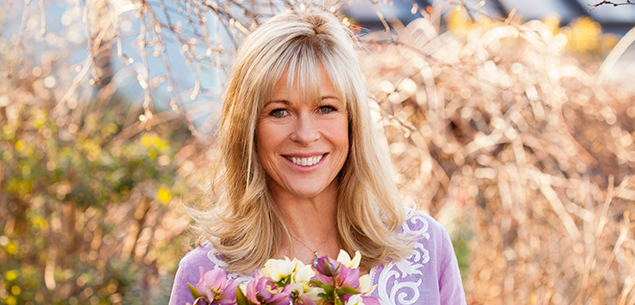Thirty seconds into interviewing Annabel Langbein, a very Annabel Langbein thing occurs.
We are sitting in the lounge of her Auckland home, when her husband Ted Hewetson barrels through the door with two boxes of buffalo mozzarella and two of the cheesemakers themselves.
Annabel greets both with equal measures of enthusiasm – she really loves people, and she really loves cheese. She and Helen, from Clevedon Buffalo Co., get into a conversation about how much they are enjoying this stage of their lives when Helen says: “It’s a wonderful time to be a woman.”
This mirrors the exact conversation we’ve just been having, where Annabel is saying how surprised she has been to realise that the life stage she’s now in happens to be the best one.
It was a relatively recent realisation, she says, and it was borne out of the expectations that life post-50 would be, well, the opposite.
“I had always thought, ‘Oh, that’s the end of the cliff and life is just going to be over,'” she laughs.
“I always thought menopause was going to be the end of the earth. But it is so not – it’s the opposite. You have this incredible energy, and you can still feel sexy and fabulous… but there is a freedom that comes with it.”

“Sexy,” “fabulous” and “freedom”: these are words women can spend a lifetime working towards.
Annabel believes that part of the reason they are so achievable now is because the pressure is finally off.
“This will sound like an oxymoron, but to some extent, you are invisible now. When you’re young, you have a presence because you are young and everybody loves young people. As you get older, you realise nobody is looking at you – they’re looking at your daughter!” She lets out a huge laugh.
“You can still be fabulous – but you’re doing it for yourself. When you’re younger… we don’t think we’re doing it for other people, but [subconsciously] we are.”
With tea and chocolate chip cookie in hand, Annabel is in an introspective mood – something she has found comes more easily as she’s grown older.
“When you’re young, there’s so much pressure in every way. You don’t have any time because you’re always going from this thing to this thing. Life is a rush of looking after a lot of people,” she says.
“This has been very interesting to notice, now that the kids have left home – sometimes in life you can’t see these things but in this stage of life, you can look from more of a helicopter view.”
For the past 30 years, Annabel’s life has run at a relentless pace: raising two children with Ted while also building a cooking empire.
Three television series, 27 books – the latest of which, Essential, included a whopping 650 recipes. All that hard work has paid off; Annabel has been a household name for over two decades.
But she is aware now, looking back, that it came at a cost.
“I’m going to be really interested to see if the next generation feel they need to be the ‘superwomen’ we felt we had to be,” she says.
“We thought we had to have these incredible careers and be amazing partners, mothers, lovers, friends and all of this.
“That would be my counsel to young women: when I was starting out at building my career, I thought that if I got off the bus, that would be it – I wouldn’t be able to get back on it again. Nobody else in my family suffered, because they were all loved and taken care of, but you’d work a 10-hour-plus day and then come home, cook dinner, read the kids stories. You’re the person that suffers. And something is going to give. I got really burned out when the kids were little and [looking back] it’s like… I actually didn’t have to have done all that. I didn’t need to work as hard.”

She credits Ted’s long-standing support as being one of the many reasons that intense work/life balance remained sustainable.
“I couldn’t have done what I was doing if I had married anyone else. He’s been incredibly nourishing of not just me, but of my ideas and what I want to achieve. I think that’s really lucky – that’s what you want in a partnership: that you can support each other to be your best selves.”
Annabel laughs that neither she nor Ted were prepared for how good this stage of their relationship was going to be.
“He often says that, too, that this is so much fun. We hang out a lot together and we also work together. We’re at our happiest down in Wanaka [their second home], in the sense that you’re very connected to the land. He’s out in the garden all day, I’m pottering around writing, cooking, gardening. It’s a very simple rhythm and we don’t get sick of each other’s company, which is the surprising thing,” she says.
“It sounds so clichéd and corny but it really is such a special time.”

Part of the joy of being such a recognisable face and name is that Annabel is often stopped by people wanting to talk about her recipes (case in point, I can’t help but tell her that half The Australian Women’s Weekly team makes her Spiced Chickpeas with Spinach and Haloumi recipe once a week).
When this happens, Annabel says she likes that it’s not done in an adulating fan way but because people want to tell her how one of her recipes has slotted effortlessly into their lives.
“I grew up with a father who was a civil servant so there was always this idea that you care for your community and the people around you. My work has always been about how can I make your life easier?”
Annabel takes the position of trust that the public has placed her in very seriously.
It’s one of the reasons why a recent internet scam that circled round social media was something so personal. Her face and name were attached to a beauty product scam that also misused the public image of other well-known Kiwi women.
People who clicked on the link were asked to provide their bank account details and many ended up losing hundreds of dollars. As soon as she discovered she was a target, Annabel posted a message on her social media accounts, warning people of the scam. But she was deeply frustrated by how powerless she felt.
“There was such a sense of outrage and then I could do nothing about it!” she says.
“These are sponsored posts that Facebook and Instagram are making money out of. We’re entering a very complex time where some of these companies have so much power and no accountability – and that really does drive me mad.”
That trust – or lack thereof – is behind one of her other big projects; working to keep genetically modified organisms (GMOs) out of the food chain in New Zealand.
“I’m committed to that to protect New Zealand’s brand image. People want food they can trust. People want safe food.”
The potential destruction of the food chain is something we need to take seriously, she says.
“Sure, how are we going to feed the world? But a lot of feeding the world is about politics.”
There are a lot of clever people in New Zealand coming up with volunteer food services to help combat the ideas of food waste, and lack of food, and this is a space she is interested in moving into.
“Instead of everyone having to have their own infrastructure, there’s knowledge from these different areas that can become one. If anyone reading this is already doing it, I’d love to know about it!”
Annabel has also teamed up with Sanford and Sons – the oldest fishmonger in New Zealand – to help promote sustainability when it comes to the kinds of fish Kiwis consume.
“We have over 100 different seafood species – however most of us only know and enjoy a handful.”
She’s created an online series to help cooks come to grips with lesser known species, like trevally, kahawai and mullet, which are cheaper but still give great flavour, and also help take the pressure off the popular fish.
It fits in seamlessly with Annabel’s aim to help us all focus on making our lives both simpler and more sustainable – lighter for us, lighter on the planet.

Balancing out all that work is now much easier – there’s a good amount of fun currently happening in the world of Annabel Langbein as well.
She’s just returned home from a dream trip abroad for two months, which included taking part in the historical Camino de Santiago – the ancient pilgrimage hike that has various routes throughout Europe.
She and two friends did their walk along the Portuguese coast and, to paraphrase Sinatra, they did it their way.
“I didn’t want to be a martyred pilgrim,” Annabel jokes, in reference to the fact that the typical way of doing the journey is to walk 25km a day, for about five weeks, staying at Camino-specific hostels and sleeping alongside fellow pilgrims.
“I’ve got a dodgy hip and a dodgy knee, so I didn’t want to be doing anything too up and down,” she says.
The trio made some personal adjustments.
“We only had nine or 10 days, so we knew we weren’t going to be able to walk the entire thing. And we decided we would Uber or taxi when needed,” she laughs.
They also hired baggage carriers so they weren’t lugging their packs with them and, as the main focus, they turned it into a foodie’s trip.
“Let’s look on Google for a nice restaurant and see if we can just walk there” was the basic strategy.
“It was a really good trip, because it wasn’t dirgy and purgatory and we didn’t stay in hostels with 27 other people in one room. We found little hotels along the way and they were clean and friendly. That’s what made it fun! It did have that sense of adventure – but you could still have a hot shower at the end of the day. You could still go to a tiny café and have a great coffee.”
Travel has been one of Annabel’s great loves since she was a teenager.
Her mother took her to Europe at the age of 17, “when it looked like I might be about to turn into a hippie and she thought she might be able to turn me around by taking me to great art galleries,” Annabel laughs.
She can still remember getting off her first long-haul flight in Singapore.
“That heady air and the smell of all those little lanes of barbecue. That was the beginning of all of this.”
Annabel’s life following that reads like the stuff of movies, and partly because it’s so distinctly New Zealand. Despite her mother’s attempts to bring Annabel over to the side of culture, she took quite the right-turn in her late teens and ended up being a possum trapper.
“I had this really dodgy boyfriend… I managed to get rid of the dodgy boyfriend, but carried on being a possum trapper.”
A successful one, too – she bought her first house at 20 with her earnings. It’s also how she first met Ted. It’s a well-told story, she says, but it’s a goodie.
One day Annabel was out hunting possums on someone else’s land when she heard a horse approaching.
“So I climbed a tree and saw this guy come along on this horse… he was so good-looking I almost fell out of the tree. He didn’t see me though. Six months later I decided I needed to get back into society – I’d done that chapter; I always like to think of them as chapters.”
She turned up to a look at a flat and there were all these photos along the wall of a farm she recognised, but she kept her mouth shut.
“One day, Ted turned up and I thought, ‘I know you, but you don’t know me.'”
Turns out one of Annabel’s flatmates was Ted’s sister.
“There was this incredible chemistry, but we didn’t do anything about it for ages.”

From her Gisborne winery days to being her happiest at home in her garden, Annabel has always had a love of food and nature.
It took two years for Annabel to tell Ted how she’d seen him before. But even then, the pair didn’t get together, despite the chemistry.
Aged 22, she was off to backpack around South America for two years, looking for adventure.
There was hitchhiking and partying and a time when she ran her own bar in the Brazilian beach town of Búzios, making tiny savoury croissants stuffed with anchovies, which she ate while drinking and playing backgammon with her friends and getting “very fat”, she laughs.
But then the Falklands War hit and she moved on to Ibiza, before getting homesick and coming back to New Zealand aged 25.
The culture shock hit pretty hard, she said.
“I didn’t really feel like I fitted in anywhere.” But it was the beginning of a love story with Ted, even if the pair didn’t fully make it official until later on in the 1980s.
“We got engaged in Buenos Aires. Four years later I got pregnant, and Ted said, ‘I’m not having a child out of wedlock,'” Annabel recalls.
“I had this beautiful piece of hand-made lace from that first trip to Spain and I had Patrick Steel design it into a dress. But I’d only bought 1.2m of it and I remember Patrick saying, when I went in for a fitting, ‘You’re going to have to hurry up and get married because I’m going to run out of material.'”

While on her recent overseas trip, Annabel enjoyed a reunion with her children Sean (above), who is a doctor in the UK, and Rose, who lives and works in New York.
Sean was born in 1992 and Rose two years later – both children have gone on to inherit their parents’ wanderlust and work ethic.
Sean recently graduated from Oxford University in the UK as a doctor and is currently working for the NHS. Rose is now based in New York, working in marketing and creative with an innovative “green” restaurant chain.
The family reunited as part of the recent holiday abroad and it was a lovely, special time, Annabel says.
“When they go, I get a couple of days where it’s like separation anxiety, almost. Your heart physically hurts. They’re off living their lives and you don’t forget about them… but you pretty much do,” she laughs.
“Because they’re living their life and you’re living your life. They know if they need me, I’ll be there and I know if I need them, they’ll be there. But you give them wings so that they can fly.”
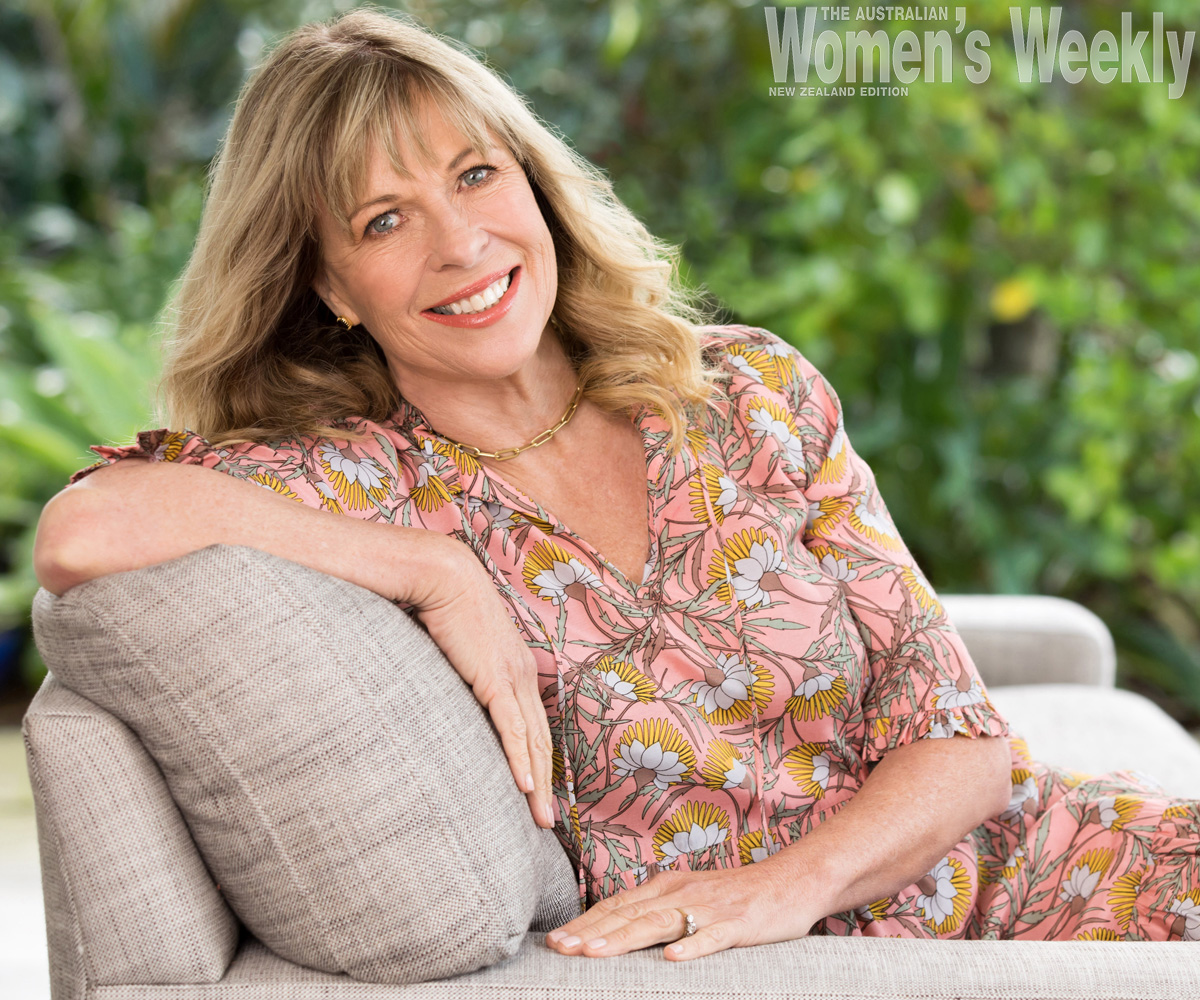
There are so many possibilities when it comes to travelling at this stage in your life, Annabel says.
“Because you’re free! You can start rebuilding your own life. And that’s also true for your relationships and spending time with friends. It’s so rare! When your kids are young, you’re honestly just… spinning.”
Time has become something to luxuriate in – and the ability to work remotely has only added to this freedom.
“I can go away for a couple of months because I’ve got my computer,” Annabel says.
“So I could do a couple of hours of work after the [Camino] walk, and then have the rest of the day to spend wherever I was.”
It’s good news that the work/life balance has been achieved, because there is still a lot left to be done.
When I ask if she’s ever considered writing a memoir, Annabel says, “I’m not sure… In some ways I feel like all my life I’ve been warming up for now, and my best work lies ahead of me!”
Being part of the food community is still very much a priority to her. Food is a basic need that represents so much more: comfort, love, nourishment, connection and celebration.
“People used to think, ‘Oh, it’s food, it’s not important,’ but to me, creating a sense of home and a sense of belonging and a sense of achievement is increasingly difficult – but food can do it. If you can cook, you can make other people happy, you can make yourself happy, you can make your house feel like a home.”
